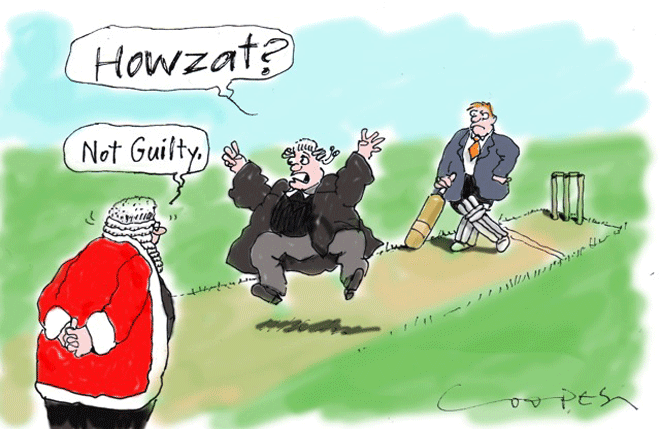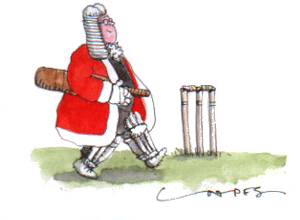Law 20.1.2
 Sports Desk •
Sports Desk •  Wednesday, July 5, 2023
Wednesday, July 5, 2023 Cricket and constitutional government ... The jurisprudence of dead balls ... Jurisdiction ... Lawn bowls c.f. cricket ... Ethical consistency ... Democratic inclinations ... Bazball ... Cricketing aesthetics ... From Our Cricketing Correspondent Wallace Grout

Any cricket fan with a penchant for pedantry (that being most of them) is likely to appear suddenly and inform you that, in fact, cricket is a game of capital-l Laws.
In this sense, H.L.A. Hart was egregiously mistaken when he referred to the 'rules of cricket' in The Concept of Laws.
As was Judith Schklar when she dismissed the rules of sport as being irrelevant to legal theory.
These Laws, most definitely, are something higher. Lord Harris, a former president of the Marylebone Cricket Club, proclaimed:
"We cricketers ... are something more than participants in a game, we are the ministers of a high moral and educational medium."
For The Cricketer, "cricket stands for law and order ... the game represents constitutional government," no less.
When Alex Carey caught Johnny Bairstow out of his crease on Monday, rage tore through "the parliament of cricket," and ministrations of high morality began forthwith.
As Somerset cricketer R.C. Robertson-Glasgow foreshadowed 75 years ago:
"The air of holy pomp started from the main temple at Lord's and it breathed over the Press like a miasma."
In shouting, abusing and grabbing at the Australians as they strode through the Long Room, the legislators of the MCC demanded answers: had Pat Cummins exposed the slippery slope of cricketing positivism? Was Ben Stokes' embrace of Dworkinism a noble effort to reconcile morality with the strictures of the Law? If it was "not cricket" did the umpires have jurisdiction to rule on the appeal?
With Usman Khawaja and David Warner's full responses to the members' enquiries as yet unavailable, a consideration of the parties' jurisprudential positions with regards to Law 20.1.2 is thus necessary.
The matter at hand
The finest mind in cricket jurisprudence, David Fraser, author of book chapters such as 'Murali, Shoaib and the jurisprudence of chucking,' and 'Walking, the judicial function and the rule of law', clarifies the point at issue:
"[Law 20] is clear in listing when a ball is dead and what many of the consequences of a call and signal of dead ball are. However, it does not clearly establish the basic jurisprudential point which is central for any determination under the circumstances, i.e. is the ball 'dead' per se or is the ball 'dead' only when the umpire says it is?"
Was it cricket?
First, it is necessary to establish jurisdiction. Charged with interpreting and applying the Laws, as well as judging 'fair play', the umpire "exercises both common law and equitable jurisdiction" during a game of cricket.
However, where allegations are made that a certain act 'isn't cricket,' does it follow that "there is no game" and the umpires are shorn of the basis of their jurisdiction?
Is Carey someone who, as Fraser puts it, "in appearance shares our hermeneutic and ethical understandings of 'cricket', yet voluntarily places themselves outside the community?"
Certainly, while the act itself may have more resemblance to lawn bowls than cricket and might offend the aesthetic sensibilities of some, it remains true that he was on a cricket field, in cricket whites and gloves.
Importantly, Fraser notes that "to condemn [fielders] who make false appeals, we deny the right of access to justice and adjudication".
It would be inequitable and offensive to the aims of cricketing justice were the Australians to be denied the right to have the merits of their appeal heard by an independent adjudicator on the basis of a marginal jurisdictional question.
The Australians
 Pat Cummins, unlike the English, had kept his jurisprudential cards close to his chest in the lead up to the Ashes. In the post-match press conference, however, the Australian captain revealed his team's essential positivism: "That's how the rule is ... you leave the rest to the umpires."
Pat Cummins, unlike the English, had kept his jurisprudential cards close to his chest in the lead up to the Ashes. In the post-match press conference, however, the Australian captain revealed his team's essential positivism: "That's how the rule is ... you leave the rest to the umpires."
For Hart, "one essential element of justice is the principle of treating cases alike".
To depart from the Laws and embark upon a moralistic interpretation of Law 20.1.2 risks introducing an element of arbitrariness into the Laws. The authority of the umpire is undermined and the Laws become applied according to the situation of the game or the proclivities of the fielding captain.
For a game which has previously billed itself as "representing constitutional government," the arbitrariness advocated by Stokes and McCullum is dangerously anti-democratic.
While Cummins' team has been accused of being "same old Aussies" and "always cheating," their stance is ethically consistent.
In A Sporting Dilemma and its Jurisprudence, Lenta and Beck note:
"Since, for positivists, rule following promotes values independent of the consequences rules produce, the existence of a valid rule is always a reason for applying it."
In contrast to the Australians' well-known prior disregard for the Laws, Cummins' team - as seen in the Carey stumping - has grounded itself in a culture of law-following and ethical values.
The English
Constitutional theorist Giovanni Sartori wrote:
"English scholars understate their constitution ... and leave the alien reader with the feeling that, in the final analysis, the English people are clever and fine people who know how to go about in politics."
The English approach to the stumping questions relies upon the same presumed sense that they "are clever and fine people who know how to go about in [cricket]."
In saying that "I'm not disputing that it was out," but that he would "have a deep think about the spirit of the game" and would not wish to win a game in the same manner, Stokes' England has adopted the Dworkinian position:
"When the literal interpretation of the law leads to an unjust consequence, [Cummins] should interpret the rule in light of the purpose of the legal system as a whole."
Further escalating matters by taking the drastic and inflammatory step of taking beers off the table, the English team maintain that they have suffered an injustice.
It is difficult, however, to ascertain which moral principles have been so offended by the Australians' behaviour. Precedent counts against the existence of a norm against such stumpings – W.G. Grace did the same in the very first Test match.
The worst offence seems to be against cricketing aesthetics. In recent times, England's Bazballing ways have harked back to the amateurism of the time of Lord Harris, where cricketers of the right class participated for love, triumphing through natural talent and approaching the game in the 'right' manner.
Gemmell writes:
"Adventurous play was an expression of sportsmanship; a moral worth - the amateur was associated with the provision of example and leadership."
Stokes and co echoed Lord Hawke, who said:
"I would sooner we lost matches by sporting cricket than that they should be drawn by unattractive play."
The purpose of the Laws under Bazball is to permit the conditions for great times and good vibes. If they cause distaste according to dictats of England's contemporary amateurism, then they should be ignored for a self-defined greater good. It's a noble aim, but, alas, difficult to argue from a jurisprudential standpoint.
Nevertheless, whatever one makes of the issue, it pays to remember cricket's special deference to law and respect for morality. The headlines in Wisden's annual 'Cricket and the Law' section are testament to this elevated relationship:
"Football fan sentenced for 'boob cricket' ... Snorting in the stands ... Lawyer impersonates dead client for members' tickets."










Reader Comments